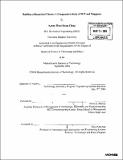Building a biomedical cluster : a comparative study of MIT and Singapore
Author(s)
Ching, Kenny Hwee Seong
DownloadFull printable version (36.71Mb)
Other Contributors
Massachusetts Institute of Technology. Technology and Policy Program.
Advisor
Fiona E. Murray.
Terms of use
Metadata
Show full item recordAbstract
Clusters comprise of a particular set of ingredients, which includes researchers, entrepreneurs, venture capitalists, well-trained and educated workers, and specialized professional services. The importance of each ingredient is undeniable, yet the proximity to research centers and institutions is perhaps the most critical element of success for technology clusters. This thesis focuses on the Massachusetts Institute of Technology (MIT), and examines its role in the development of the biomedical industry cluster in Cambridge, Massachusetts. However, while the important role that academic institutions play in the process of transforming science to marketable technology is acknowledged, the question of who are the actual researchers most intimately involved in this process remains unanswered. Drawing on quantitative data, we show that the majority of commercially related research work is performed by a small fraction of the researchers, and this group is heterogeneous in characteristics. Moreover, through a novel way of examining publication data, we also show that the commercial productivity of each researcher is positively related to the researcher's relative level of applied science research. Over the past two years, Singapore has been among the most aggressive of the East Asian countries in pursuing the development of its biotechnology industry. By benchmarking Singapore against MIT, we recommend that Singapore raise its level of applied science research, to improve the integration of academic research into the marketplace.
Description
Thesis (S.M.)--Massachusetts Institute of Technology, Engineering Systems Division, Technology and Policy Program, 2004. Includes bibliographical references (leaf 54).
Date issued
2004Department
Massachusetts Institute of Technology. Engineering Systems Division; Technology and Policy ProgramPublisher
Massachusetts Institute of Technology
Keywords
Technology and Policy Program.